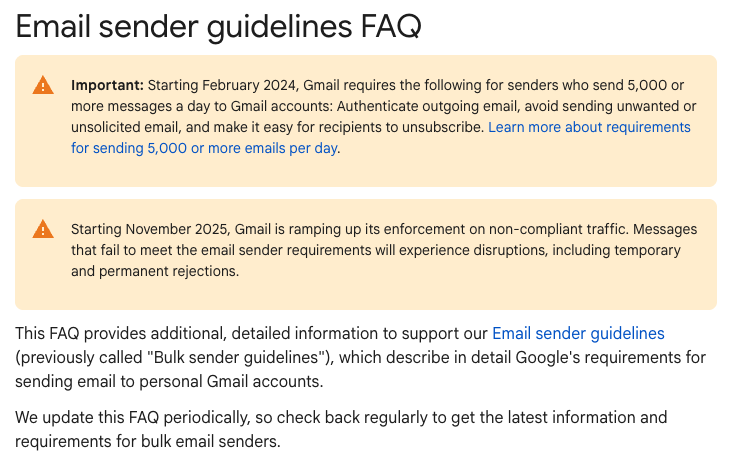
Yes. Gmail is increasing enforcement of its bulk sender rules starting November 2025, which means unauthenticated or non‑compliant mail to Gmail addresses is more likely to be delayed or rejected.

Bulk senders! Organizations that send 5,000 or more messages to Gmail addresses within 24 hours are the primary audience. This includes email marketers, CRM platforms, SaaS apps, and large newsletters. Smaller senders can be affected too if their messages trigger authentication failures or abuse signals.
Here's what we know about the Google announcement: "Starting November 2025, Gmail is ramping up its enforcement on non-compliant traffic. Messages that fail to meet the email sender requirements will experience disruptions, including temporary and permanent rejections."
Verify SPF, DKIM, and DMARC records; ensure alignment; check reverse DNS and HELO/EHLO setup; require TLS on mail connections; and add a one‑click unsubscribe link that honors opt‑outs. Monitor your spam complaint rate and aim to keep it under 0.1% to avoid attention from Gmail’s enforcement systems. Get started with Palisade now!
Better enforcement helps cut down on spoofing and abusive bulk mail, improving inbox quality for recipients. For legitimate senders, it means that following best practices will improve deliverability over time. It also aligns Gmail’s behavior more closely with Microsoft’s earlier enforcement moves, creating a wider industry expectation for authenticated and well‑behaved mail streams.
These new requirements and stricter enforcement measures are designed to protect the overall email ecosystem. The goal is to make email safer and more reliable by making it easier to identify legitimate and malicious senders helping inboxes keep wanted messages in and unwanted messages out.
If you’re already following best practices, authenticating your emails correctly, maintaining a solid sender reputation, and respecting user preferences these changes will work in your favor.
With Microsoft’s enforcement earlier this year and Google’s latest crackdown, the industry is clearly moving toward a shared standard centered on authenticated, permission-based email. Meeting these requirements is no longer optional.
And it all starts with visibility. Our Palisade tool helps you see exactly who’s sending on behalf of your domains, track SPF/DKIM/DMARC pass/fail and alignment by sender, and identify configuration issues before they cause mail delays or blocks.
Start with SPF, DKIM, and DMARC configuration and alignment. Confirm DNS entries and that sending IPs have valid rDNS and HELO/EHLO settings.
Look for authentication failures in your mail logs and DMARC reports. Fix the failing records and monitor retry behavior; temporary deferrals may clear once issues are corrected.
Yes! Any sender producing authentication failures or high complaint rates can see delivery problems, regardless of size.
Microsoft already began enforcing similar requirements in 2025; Gmail’s move narrows the gap, making industry standards more uniform.
Palisade provides tools and guidance to audit and fix authentication issues, check your DMARC status, and monitor compliance. Use Palisade’s Email Security Score for DMARC, BIMI, DKIM, and SPF checks: https://www.palisade.email/tools/email-security-score